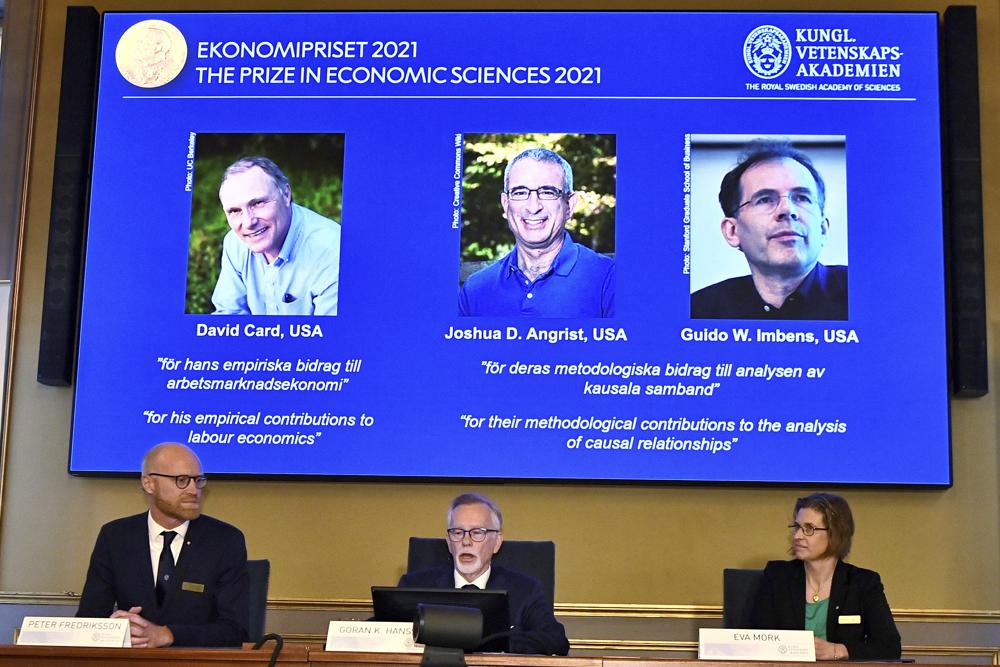Permanent Secretary of the Royal Swedish Academy of Sciences Goran K Hansson, center, announces the 2021 Nobel prize for economics, flanked by members of the Royal Swedish Academy of Sciences Peter Fredriksson, left, and Eva Mork, during a press conference at the Royal Swedish Academy of Sciences, in Stockholm, Sweden, Monday, Oct. 11, 2021. From left on the screen above are the winners David Card of the University of California at Berkeley; Joshua Angrist from the Massachusetts Institute of Technology; and Guido Imbens from Stanford University. (Claudio Bresciani/TT via AP)
STOCKHOLM (AP) — A U.S.-based economist won the Nobel prize for economics Monday for pioneering research that showed an increase in minimum wage does not lead to less hiring and immigrants do not lower pay for native-born workers, challenging commonly held ideas. Two others shared the award for creating a way to study these types of societal issues.
Canadian-born David Card of the University of California, Berkeley, was awarded half of the prize for his research on how minimum wage, immigration and education affect the labor market.
The other half was shared by Joshua Angrist from the Massachusetts Institute of Technology and Dutch-born Guido Imbens from Stanford University for their framework for studying issues that can’t rely on traditional scientific methods.
The Royal Swedish Academy of Sciences said the three have “completely reshaped empirical work in the economic sciences.”
In a study published in 1994, Card looked at what happened to jobs at Burger King, KFC, Wendy’s and Roy Rogers when New Jersey raised its minimum wage from $4.25 to $5.05, using restaurants in bordering eastern Pennsylvania as the control — or comparison — group. Contrary to previous studies, he and his research partner Alan Krueger, who died in 2019, found that an increase in the minimum wage had no effect on the number of employees.
Card’s minimum wage research fundamentally altered economists’ views of such policies. As noted by the Economist magazine, in 1992 a survey of the American Economic Association’s members found that 79% agreed that a minimum wage law increased unemployment among younger and lower-skilled workers. Those views were largely based on traditional economic views of supply and demand: If you raise the price of something, you get less of it.
By 2000, however, just 46% of the AEA’s members said minimum wage laws increase unemployment, largely because of Card and Krueger’s research. Their findings sparked interest in further research into why a higher minimum wouldn’t reduce employment. One conclusion was that companies are able to pass on the cost of higher wages to customers by raising prices. In other cases, if a company was a major employer in a particular area, it may have been able to keep wages particularly low, so that it could afford to pay a higher minimum without cutting jobs. The higher pay would also attract more applicants, boosting labor supply.
Card also found that incomes of those who are native born workers can benefit from new immigrants, while immigrants who arrived earlier are the ones at risk of being negatively affected. To study the effect of immigration on jobs, Card compared the labor market in Miami in the wake of Cuba’s sudden decision to let people emigrate in 1980, leading 125,000 people to leave in what became known as the Mariel Boatlift. It resulted in a 7% increase in the city’s workforce. By comparing the evolution of wages and employment in four other cities, Card discovered no negative effects for Miami residents with low levels of education. Follow-up work showed that increased immigration can have a positive impact on income for people born in the country.
Angrist and Imbens won their half of the award for working out the methodological issues that allow economists to draw solid conclusions about cause and effect even where they cannot carry out studies according to strict scientific methods.
Card’s work on minimum wage was an example of a “natural experiment,” or a study based on observation of real-world data. The problem with such experiments is that it can sometimes be difficult to isolate cause and effect. For example, if you want to figure out whether an extra year of education will increase a person’s income, you can simply compare the incomes of adults with one more year of schooling to those without.
Yet there are many other factors that may determine whether those who got an extra year of schooling are able to make more money. Perhaps they are harder workers or more diligent and would have made more money than those without the extra year even if they did not stay in school. These kinds of issues cause economists and other social science researchers to say “correlation doesn’t prove causation.”
Imbens and Angrist, however, developed statistical methods to get around these challenges and determine more precisely what can actually be said about the causes and effects of natural experiments.
“I was just absolutely stunned then to get a telephone call,” Imbens said from his home in Massachusetts. “And then I was just absolutely thrilled to hear the news … that I got to share this with Josh Angrist and and David Card,” whom he called “both very good friends of mine.” Imbens said Angrist was best man at his wedding.
Krueger, who worked with Card on some of the research that won the Nobel, died in 2019 at 58. He taught at Princeton for three decades and was chief Labor Department economist under then-President Bill Clinton. He served in the Treasury Department under then-President Barack Obama, then as Obama’s chairman of the Council of Economic Advisers. Nobel prizes are not awarded posthumously.
The award comes with a gold medal and 10 million Swedish kronor (over $1.14 million).
Unlike the other Nobel prizes, the economics award wasn’t established in the will of Alfred Nobel but by the Swedish central bank in his memory in 1968, with the first winner selected a year later. It is the last prize announced each year.
—-
Rugaber reported from Washington and McHugh reported from Frankfurt, Germany.
Copyright 2021 Associated Press. All rights reserved.
Source: https://apnews.com/article/nobel-prizes-business-europe-3cbc672f994ae6f4f486a68b52c2bb32










































